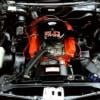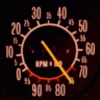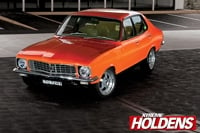Bahahahaha omg that is so frOcking funny yet so frOcking rugged.
Oil viscosity
#51
 _Bomber Watson_
_Bomber Watson_
Posted 31 July 2014 - 10:14 PM
#52

Posted 31 July 2014 - 10:51 PM
Edited by hanra, 31 July 2014 - 10:52 PM.
#53

Posted 31 July 2014 - 10:53 PM
Obviously the 2 warnings and the reply i wrote wasn't enough. Next time it's a holiday.
Yeah Laz, & you've really shown what you write.. ..you aint real high on the validity factor quotient , eh Laz..
Credulity, yes... credibility.. nah sorry, not so much..
Whatever big red, warn away.. its just more typical girls school shit anyhow..
#54
 _judgelj_
_judgelj_
Posted 01 August 2014 - 12:12 AM
#55

Posted 01 August 2014 - 01:23 AM
I put 40/70 in my old work horse Motors
New vs Old
#56
 _Muzzy_
_Muzzy_
Posted 01 August 2014 - 07:41 AM
Hey mate you still having trouble with chatty lifters?
I assume you mean me, I replaced the lifters under warranty, and problem now only crops up for a few secs each morning as apart from after a few hours, this is on 15-40 oil if go heavy oil the problems is worst, hence my post, before it became a slinging match
Edited by Muzzy, 01 August 2014 - 07:42 AM.
#57

Posted 01 August 2014 - 08:26 AM

Edited by orangeLJ, 01 August 2014 - 08:27 AM.
#58

Posted 01 August 2014 - 08:41 AM
Simple question on oil viscosity
What is best for a holden red 6
10-40
15-40
20-40
Not concerned with brands, that all about you wallet size
You mean 20-50?
I never seen or heard of 20-40.
#59

Posted 01 August 2014 - 10:34 AM
I believe most oils have going away from 20-40 oils, it's usually 15-40 or 20-50. I know I have seen 20-40 though, think I have an old can in the shed.
#60
 _judgelj_
_judgelj_
Posted 01 August 2014 - 11:22 AM
I assume you mean me, I replaced the lifters under warranty, and problem now only crops up for a few secs each morning as apart from after a few hours, this is on 15-40 oil if go heavy oil the problems is worst, hence my post, before it became a slinging match
Yeah mate, just trying to ignore to shit slinging and cut to the chase.
Strange that isnt it, mine doesnt do it after warm up, only on startup. But it didnt do it for the first few hundred k's after running in the cam.
#61
 _J.A.W._
_J.A.W._
Posted 01 August 2014 - 11:35 AM
Hydraulic lifters are fundamentally variable in effective height, & may pump up or crush down, causing dramas..
If the clatter noise does not go away as oil pressure/temp is normalised after start up, you may have a problem..
When the Group A rules forced the Holden 5ltr V8 users to run hydraulic lifters there were a few tricks used to limit that..
..since they were punching pushrods through the original stamped rockers, 'til the evolution homologation allowed roller rockers..
Other tricks were used to limit the lifter internal hydraulic movement range..
#62
 _J.A.W._
_J.A.W._
Posted 01 August 2014 - 11:48 AM
Funny things occur too, like the lifter closest to the oil pump pulse gets the hardest time pressure-wise
& can collect crud enough to make it lock up before the rest.. ..another reason to run good oil & filter..
Seriously though, for a Torana mill, go solid, get a decent cam, learn to set valve clearance & you'll never go back..
#63

Posted 01 August 2014 - 08:27 PM
Yep, like let them pump up and give them a "feel" clearance even.Other tricks were used to limit the lifter internal hydraulic movement range..
#64

Posted 02 August 2014 - 12:00 AM
http://www.penriteoi...id_viscosity=22
I just use this anyway, Motor Runs Fine.
3.3 Blue Motor in a WB Tonner x 3.55 LSD
#65
 _oldjohnno_
_oldjohnno_
Posted 02 August 2014 - 11:07 AM
http://www.penriteoi...id_viscosity=22
I just use this anyway, Motor Runs Fine.
3.3 Blue Motor in a WB Tonner x 3.55 LSD
Probably should mention a few things that not everyone is aware of. Someone has already helpfully shown us the chart showing the relationship between SAE numbers and actual viscosity, and it's plain to see that the SAE numbers refer to a very broad range. So broad in fact that they are almost useless. But it gets worse - if you check the actual viscosities of a lot of common oils you find that they don't match up at all with the SAE numbers and sometimes they are way, way off.
I think the reason for this is that while the oil might be marketed as a 20/50 or a 15/40 there's nothing there to say that they are actually an SAE20/50 or an SAE15/40 oil. The numbers are just a sort of a marketing device and aren't SAE numbers at all. As I've said here before, the only safe way is to ignore these numbers (SAE or otherwise) and look up the actual viscosity before you buy. Some of the Penrite stuff in particular is insanely thick. If you don't feel like looking up the viscosities they are listed for some common oils in this page I linked to earlier - http://www.oldjohnno.../OilTables.html
The other thing I want to mention is oil pressure, and in particular why we don't want it to be too high. A lot of old blokes are still under the impression that oil pressure matters, and that lots of pressure is a good thing. The reality is that it doesn't tell us much at all. How much do we want? Ideally, at full load we'd want it to be just under the relief valve setting. We don't need a lot of pressure at full load and speed to build the hydrodynamic wedge, the high journal speed can do that by itself. But we do need a lot of flow to keep the bearings cool. I've never seen a crank burnt because the oil was too thin but I have seen them lunched because it was too thick. I'm gonna shout this bit because it's so important : ANYTIME THE OIL PRESSURE IS ABOVE THE RELIEF VALVE SETTING THE VOLUME OF OIL PUMPED TO THE BEARINGS IS LIMITED. YOU DO NOT WANT THIS.
Dave, I remember reading in earlier posts that your engines mainly die from big end failure. I'd certainly be trying a (lot) thinner oil in my next build and I'd be very surprised if it doesn't improve the bearing life dramatically. Don't worry about oil pressure; if it has 5 -10 at idle and 20 or so pottering around town it'll be getting the full volume and will live forever. Ideally it wouldn't reach the relief setting until at least 4 or 5000rpms. You'll be assured of a plentiful supply to the bearings and a long bottom end life.
Another reason to avoid thick oils is that they don't release entrained air anywhere nearly as quickly as thin ones, and the bubbles are generally bigger. The gauge may show 60psi but if a bearing is fed nothing but air for a second or two at full load then it's all over. Look at what the OEMS have been doing for the last couple of decades - clearances have stayed much the same but oil viscosities have steadily fallen, outputs have increased but engine life has
generally grown longer. Thinner oils just plain work, it's just a matter of losing the preoccupation with the pressure gauge.
#66

Posted 02 August 2014 - 12:02 PM
would like to know what you would use
oh its a 202 of course
thanks
#67
 _oldjohnno_
_oldjohnno_
Posted 02 August 2014 - 12:41 PM
I don't think the engine really cares what brand oil it is, providing the viscosity and zinc levels are in the ballpark. I just buy whatever's cheap at the time, lately it's been Penrite Everyday 15 40 but I've used a lot of Delo 400 too. There are dozens of similar oils and I'm sure they'd be fine. If you like synthetics (I don't think they're anything special) then Mobil 1 15W50 is very good but avoid the other Mobil1s.
Use a good filter too - and by good I mean Wix, Baldwin or Fleetguard. Avoid "performance" filters like the plague.
#68

Posted 02 August 2014 - 01:35 PM
Johnno, what is your take on cars that specify 10W-30 or 5W-30? My V2 CV8, SR5 Hilux V6 and Lexus RX350 all do this. I use Nulon synthetic 10W-40, primarily as most manufacturer's specify if you are going to do any towing, long distance driving or the ambient temp exceed 30deg C you should use 10W-40 or 15W-40.
#69
 _oldjohnno_
_oldjohnno_
Posted 02 August 2014 - 02:28 PM
First I should say that I don't claim to be an oil expert. But I strongly suspect that you could use any of those under any conditions without problems. Because the SAE numbers cover such a big range you'll probably find that one makers 10w-30 is as thick as anothers 15w-40 anyway, or that the 5w-30 is no thinner than some other 10w-30s. I also suspect that failures due solely to the type of oil used are extremely rare, and that so long as you can ensure an uninterupted supply then anything that's in the ballpark will be fine.
#70

Posted 02 August 2014 - 02:39 PM
#71
 _oldjohnno_
_oldjohnno_
Posted 02 August 2014 - 02:50 PM
Well it's worked nicely for eleventy-billion motorcycle engines... and the old Mini engines have been around forever so I'd expect that it'd be pretty well known in those circles what works and what doesn't. The only problem I could foresee would be friction-modifiers and synchro rings, but a motorcycle oil would take care of that. Really though the Mini gurus are the ones to ask.
#72

Posted 02 August 2014 - 06:45 PM
..great info O.J. thanks. I always try and learn stuff like this, from guys who know.Probably should mention a few things that not everyone is aware of. Someone has already helpfully shown us the chart showing the relationship between SAE numbers and actual viscosity, and it's plain to see that the SAE numbers refer to a very broad range. So broad in fact that they are almost useless. But it gets worse - if you check the actual viscosities of a lot of common oils you find that they don't match up at all with the SAE numbers and sometimes they are way, way off.
I think the reason for this is that while the oil might be marketed as a 20/50 or a 15/40 there's nothing there to say that they are actually an SAE20/50 or an SAE15/40 oil. The numbers are just a sort of a marketing device and aren't SAE numbers at all. As I've said here before, the only safe way is to ignore these numbers (SAE or otherwise) and look up the actual viscosity before you buy. Some of the Penrite stuff in particular is insanely thick. If you don't feel like looking up the viscosities they are listed for some common oils in this page I linked to earlier - http://www.oldjohnno.../OilTables.html
The other thing I want to mention is oil pressure, and in particular why we don't want it to be too high. A lot of old blokes are still under the impression that oil pressure matters, and that lots of pressure is a good thing. The reality is that it doesn't tell us much at all. How much do we want? Ideally, at full load we'd want it to be just under the relief valve setting. We don't need a lot of pressure at full load and speed to build the hydrodynamic wedge, the high journal speed can do that by itself. But we do need a lot of flow to keep the bearings cool. I've never seen a crank burnt because the oil was too thin but I have seen them lunched because it was too thick. I'm gonna shout this bit because it's so important : ANYTIME THE OIL PRESSURE IS ABOVE THE RELIEF VALVE SETTING THE VOLUME OF OIL PUMPED TO THE BEARINGS IS LIMITED. YOU DO NOT WANT THIS.
Dave, I remember reading in earlier posts that your engines mainly die from big end failure. I'd certainly be trying a (lot) thinner oil in my next build and I'd be very surprised if it doesn't improve the bearing life dramatically. Don't worry about oil pressure; if it has 5 -10 at idle and 20 or so pottering around town it'll be getting the full volume and will live forever. Ideally it wouldn't reach the relief setting until at least 4 or 5000rpms. You'll be assured of a plentiful supply to the bearings and a long bottom end life.
Another reason to avoid thick oils is that they don't release entrained air anywhere nearly as quickly as thin ones, and the bubbles are generally bigger. The gauge may show 60psi but if a bearing is fed nothing but air for a second or two at full load then it's all over. Look at what the OEMS have been doing for the last couple of decades - clearances have stayed much the same but oil viscosities have steadily fallen, outputs have increased but engine life has
generally grown longer. Thinner oils just plain work, it's just a matter of losing the preoccupation with the pressure gauge.
In my simple little world I think I understand that you are saying that the oil pressure read by the gauge, which is really just pump output pressure, is of not so much importance. Due to the fact that most engines never die from
"low oil pressure at the pump"" bearing failures .i.e. the bearings don't give a toss about what pressure is on the
gauge/at the pump, just that there is sufficient flow where they are.
Thanks again
#73
 _Bomber Watson_
_Bomber Watson_
Posted 02 August 2014 - 09:41 PM
When i started there 8 1/2 years ago it had 0psi at idle and crept uo to about 15 psi pinned. When stone cold and holding it to build up air you would soetimes see the oil guage skyrocket to 20psi or so.
8 1/2 years later, a new oil pressure guage, and about 4000 engine hours added, guess what, still going just the same, and oil pressures are the same.
Not saying you should aim for those figures if you want engine longevity, just pointing out that whats on the guage is often irrelevant.
Cheers.
#74
 _SRV_
_SRV_
Posted 02 August 2014 - 11:07 PM
http://www.penriteoi...id_viscosity=22
I just use this anyway, Motor Runs Fine.
3.3 Blue Motor in a WB Tonner x 3.55 LSD
I use that in my Pajero farm heap to stop it blowing great clouds of smoke and fouling the plugs up in minutes. Along with a bottle of "worn engine treatment" to swell up the knackered valve stem seals it runs fine. BUT I would not use it in any healthy engine that I can think of.
On another note, is it still safe to assume that something like Delo400 or any other high detergent oil should not be used in an engine of high mileage or one with any sludge build up?
Edited by SRV, 02 August 2014 - 11:08 PM.
#75
 _oldjohnno_
_oldjohnno_
Posted 03 August 2014 - 07:43 AM
is it still safe to assume that something like Delo400 or any other high detergent oil should not be used in an engine of high mileage or one with any sludge build up?
Yes. Dirty worn out clunkers still want thick oil and low detergent. Theoretically you shouldn't run high detergent oil with very high spring pressures either (the detergent competes with the zinc) but I haven't had any problems. For a balls-out engine with big springs though it might be safer to stick with a lower det oil.
0 user(s) are reading this topic
0 members, 0 guests, 0 anonymous users



















